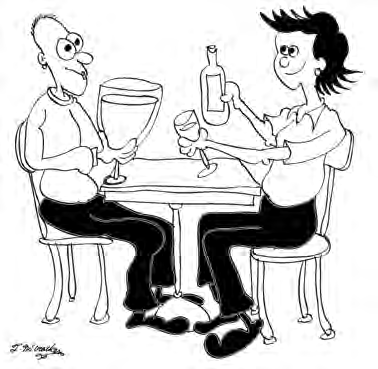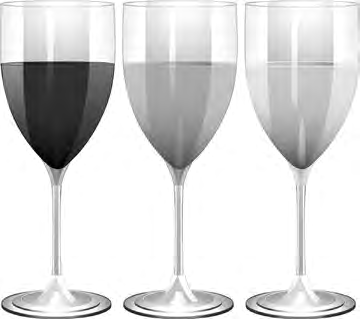100 Perks of Having Cancer: Plus 100 Health Tips for Surviving It (63 page)
Read 100 Perks of Having Cancer: Plus 100 Health Tips for Surviving It Online
Authors: Florence Strang
Tags: #Health; Fitness & Dieting, #Diseases & Physical Ailments, #Internal Medicine, #Oncology, #Cancer, #Medicine & Health Sciences, #Clinical, #Medical Books, #Alternative Medicine, #Medicine



Perk #64
Cancer Motivated Me to
Drop Some Bad Habits . . .
B
efore getting cancer, I considered myself
to be living a healthy-ish lifestyle. I
didn’t smoke, I exercised on a regular basis,
and I even ate the occasional green salad.
But ya know, we all have our vices. For some
it is chocolate (I couldn’t be bothered); for
others it’s fast food (I’d much rather cook a
leisurely meal at home); for me, it’s wine.
Nothing brings me more pleasure than sip-
ping on a cold sauvignon blanc. First my
taste buds spring to life, then I feel the
warm sensation as it hits my belly, followed
by the comforting feeling of wine-induced
Cheers!
relaxation.
Ah
. . .
It is not my fault that I was born loving wine. What did mom expect by
giving me a name like Florence? Obviously with a name that originated in
Italy, I have a genetic predisposition to want wine with every meal. But alas,
I have learned that alcohol in any form—even red wine, which can be good
for your heart—is not good for cancer. Therefore, I have had to break my
bad habit of having a glass of wine on a whim. While I still do engage in
the occasional libation, I try to limit it to just ONE glass.
For optimum health,
limit your alcohol consumption.
I 262 J


Perk #64: Cancer Motivated Me to Drop Some Bad Habits . . .
263
HEALTH TIP #64
To Drink or Not to Drink?
That is the question with no solid answer.
Look hard enough, and you can find a study that supports your habits,
whatever they may be. (I’m still on the hunt for one that says a messy desk
will add years to your life.) But alas, if you are looking for solid hard evidence
that says, “Alcohol doesn’t affect your risk of cancer,” you won’t find it.
Every five years, the American Cancer Society publishes a document enti-
tled “Nutritional and Physical Activity Guidelines for Cancer Prevention.”
Dozens of medical specialists and professionals get together and review
hundred of studies with pages of data from the previous five years to deter-
mine if there have been any significant findings that they feel they want to
share with us common folk.
Alcohol consumption is one of the topics studied. According to the most
current (2011) guideline, the report states: “Drink no more than one drink
per day for women or two drinks per day for men.” (Damn that “high meta-
bolic” Y chromosome.)
But why limit it at all? I know, you want the facts before you take such
a drastic step. I hate to be the bearer of bad news, but . . .
It has been proven that alcohol is a risk factor for the following cancers:
●
mouth
●
throat
●
voice box
●
esophagus
●
liver
●
colon and rectum
●
breast
264
100 Perks of Having Cancer
Alcohol is an irritant to tissue. (Ever get vodka in your eye? I have . . .
don’t ask.) So it makes sense that the area that alcohol “touches” as it passes
through your teeth would be at risk. Irritated cells are damaged cells. When
cells are damaged, they repair themselves. When they are repeatedly dam-
aged, they are constantly building new tissue, which can increase the like-
lihood that somewhere along the line, a mistake will be made in the DNA.
That mistake is a little thing we call “cancer.” Furthermore, in the colon and
rectum, alcohol and normal gut bacteria mix to form acetaldehyde, which
is also a cancer-causing agent.
Alcohol is metabolized in the liver, so it should come as no surprise that
it increases the risk of liver cancer. Also keep in mind that the liver is our
“detox” machine. If you mess with the machine, and it malfunctions, it
won’t be able to rid our bodies of other harmful agents like pollution, plas-
tics, chemicals, pesticides, and all the other dozens of impurities we come
in contact with every day that threaten our health.
Breast cancer looks a bit out of place on this list, but it isn’t. Alcohol
raises your blood estrogen level. Estrogen is a hormone. Breast tissue is hor-
mone sensitive. (Everyone “on the rag” right now can attest to this.) Your
breast tissue will be affected by alcohol because it affects your hormones.
Simple as that.
Recently, an interesting fact has been discovered that may have women
lining up for a new test: a serum CYP2E1 test.
At a 2012 meeting of the American Society for Biochemistry and Molec-
ular Biology, two scientists working out of the University of New Mexico
may have found a link between the presence of a protein, CYP2E1, breast
cancer, and alcohol. This protein is found in breast cells and actually breaks
down ethanol, the alcohol part of a drink. While you might think “breaking
down ethanol” is a good thing, it actually creates “free radicals” that are
cell destructors and tumor activators. But not every woman’s breasts have
the same amount of this protein. Those with low CYP2E1 have a lower risk
that the alcohol will create the destructive free radicals and cause harm.
Knowing your level could help you decide if that glass of wine would be
harmful or not.
But, on the other hand, alcohol in moderation may have the benefit
of reducing your stress. For some, that glass of wine is the “off switch” when
Perk #64: Cancer Motivated Me to Drop Some Bad Habits . . .
265
feeling stressed. Since stress is known to exacerbate many illnesses, the
relaxation effect might just outweigh some of the risk from the alcohol
itself. (At least that’s what Flo keeps telling me.) Wine’s relationship to
stress levels seems an interesting subject, although I couldn’t
find that it has been studied anywhere. (If any scientist out
Limiting yourself to
there would like to conduct this study, Flo has volunteered
one glass of wine is
to be a subject!)
suggested for reducing
Also, if your one drink a day is red wine, you are getting
cancer risk after
two important cancer-fighting agents: polyphenols and
treatment. But that
resveratrol. Both are the topics of current studies looking into
doesn’t mean you
their possible role in cancer prevention.
can’t act like you’ve
Bottom line: During treatment for cancer, you should
had three.
avoid alcohol completely, but after you’re finished with treat-
ment, one drink of alcohol—one five-ounce glass of wine,
one twelve-ounce beer, or 11/2 ounces of hard liquor per day—is fine as
long as you and your healthcare practitioner agree. Sorry, you cannot “save”
your one glass a day this week to drink seven on Saturday.
Cheers!



